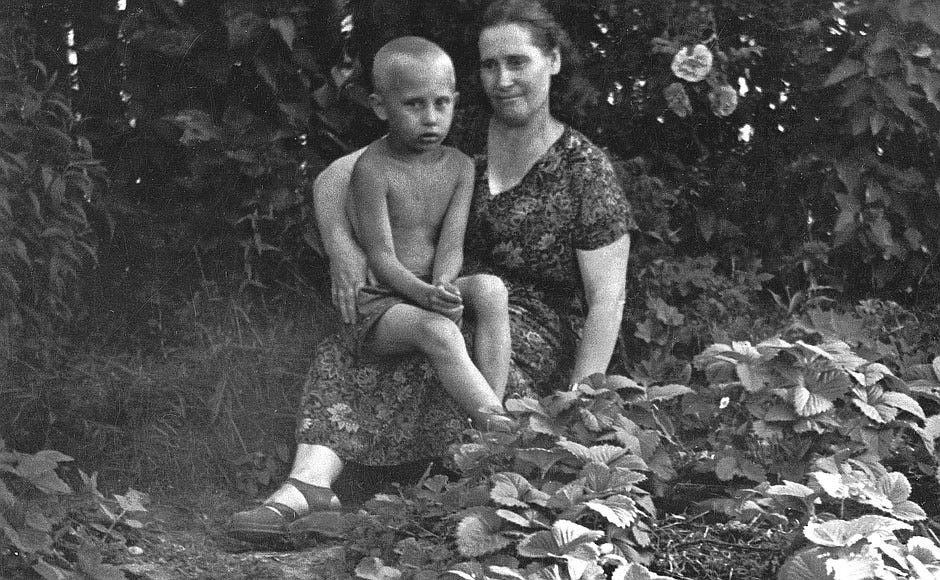The Russians are subjecting Ukrainians to the same hell the Nazis subjected to Leningraders—including the Russian president's family.
David Wood
COMMON SENSE

Maria Shelomova Putin and her son, Vladimir Vladimirovich, in 1958.
The images are eerily familiar.
Elderly women huddled against bitter cold picking their way through rubble spilling from the smoking ruins of a blackened apartment building. Stiffened bodies lying grotesquely askew on broken pavement. Household belongings strewn on the ground, backlit by roaring flames. Hollow-eyed children struggling from bomb shelters to line up for food, water.
This is not Ukraine today, but Leningrad under siege by the Wehrmacht during World War II. For 872 days, from 1941 to early 1944, Hitler’s Nazi forces sought to pummel into submission the city now known as St. Petersburg. But against the brutal German campaign to force them to their knees, the people of Leningrad held. Under vicious attack by aggressors to whom they had done no wrong, Leningraders were empowered by moral certainty. They were in the right, and they knew it.
The cost of their defiance is almost inconceivable. Buildings and homes, hospitals, schools and museums were smashed beyond recognition. Pleas to allow humanitarian relief to reach the city were rebuffed. Refugees fleeing along the one escape route were gunned down. During the first winter when the outside temperature fell to 40 degrees below zero Fahrenheit, 100,000 people a month died of hunger, disease and cold. Daily rations were three thin slices of bread adulterated with sawdust, if you could get them. When the siege was lifted, only 700,000 Leningraders of the city’s prewar population of 3.5 million remained there alive.
One of the survivors was the woman who would become Vladimir Putin’s mother.
Like thousands of other parents, Maria Shelomova Putin had sent her young son Viktor—the older brother Vladimir Putin would never know—to live in a children’s shelter while she scavenged for food. Viktor died there of diphtheria. Maria, weakened by lack of food, fainted near a pile of corpses and awakened just in time to avoid being dragged off to a mass grave.
Towards the end, Maria was too weak to walk. Her husband, Vladimir Spiridonovich Putin, was badly wounded at the front by a German grenade. But they endured. Seven years after the war ended, Maria and Vladimir had another son, Vladimir Vladimirovich. He grew up to be the president of Russia.
If Vladimir Putin didn’t experience the siege directly, he surely absorbed the gritty persona of the bare-knuckle survivor. Though much of his life is obscure, what he has allowed to emerge “is very much the mythology of a child of post-siege Leningrad, a mean, hungry, impoverished place that bred mean, hungry, voracious children,” writes author Masha Gessen.
The images are eerily familiar.
Elderly women huddled against bitter cold picking their way through rubble spilling from the smoking ruins of a blackened apartment building. Stiffened bodies lying grotesquely askew on broken pavement. Household belongings strewn on the ground, backlit by roaring flames. Hollow-eyed children struggling from bomb shelters to line up for food, water.
This is not Ukraine today, but Leningrad under siege by the Wehrmacht during World War II. For 872 days, from 1941 to early 1944, Hitler’s Nazi forces sought to pummel into submission the city now known as St. Petersburg. But against the brutal German campaign to force them to their knees, the people of Leningrad held. Under vicious attack by aggressors to whom they had done no wrong, Leningraders were empowered by moral certainty. They were in the right, and they knew it.
The cost of their defiance is almost inconceivable. Buildings and homes, hospitals, schools and museums were smashed beyond recognition. Pleas to allow humanitarian relief to reach the city were rebuffed. Refugees fleeing along the one escape route were gunned down. During the first winter when the outside temperature fell to 40 degrees below zero Fahrenheit, 100,000 people a month died of hunger, disease and cold. Daily rations were three thin slices of bread adulterated with sawdust, if you could get them. When the siege was lifted, only 700,000 Leningraders of the city’s prewar population of 3.5 million remained there alive.
One of the survivors was the woman who would become Vladimir Putin’s mother.
Like thousands of other parents, Maria Shelomova Putin had sent her young son Viktor—the older brother Vladimir Putin would never know—to live in a children’s shelter while she scavenged for food. Viktor died there of diphtheria. Maria, weakened by lack of food, fainted near a pile of corpses and awakened just in time to avoid being dragged off to a mass grave.
Towards the end, Maria was too weak to walk. Her husband, Vladimir Spiridonovich Putin, was badly wounded at the front by a German grenade. But they endured. Seven years after the war ended, Maria and Vladimir had another son, Vladimir Vladimirovich. He grew up to be the president of Russia.
If Vladimir Putin didn’t experience the siege directly, he surely absorbed the gritty persona of the bare-knuckle survivor. Though much of his life is obscure, what he has allowed to emerge “is very much the mythology of a child of post-siege Leningrad, a mean, hungry, impoverished place that bred mean, hungry, voracious children,” writes author Masha Gessen.
Indeed, Putin likes to portray himself as a thug. “I was a hooligan,” he proudly told officially sanctioned biographers in 2000. Referring to the Chechen guerillas Russia was then at war with, Putin said, in September 1999, three months before Boris Yeltsin made him president of Russia, “If we catch them in the toilet, we will rub them out in the outhouse.”

A guest post by
David Wood
Journalist and author covering war for 35 years, Pulitzer Prize in 2012 for a series on the Americans grievously wounded in war. Website: davidwood-journalist.com

A guest post by
David Wood
Journalist and author covering war for 35 years, Pulitzer Prize in 2012 for a series on the Americans grievously wounded in war. Website: davidwood-journalist.com
No comments:
Post a Comment